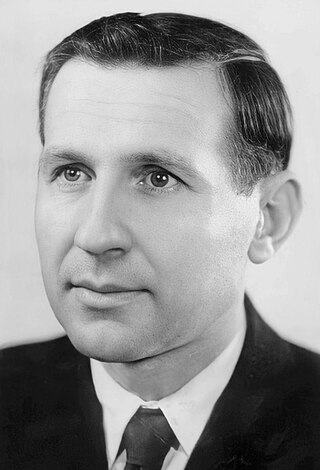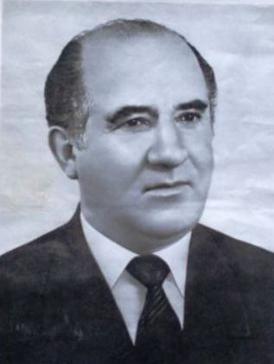Related Research Articles

Mehmet Ismail Shehu was an Albanian communist politician who served as the 23rd Prime Minister of Albania from 1954 to 1981.

Adil Çarçani was an Albanian politician who served as the 24th Prime Minister of Albania during the Communist era led by Enver Hoxha. He served as the titular head of the Albanian government in the years immediately preceding the fall of Communism.

The 1997 Albanian civil unrest was sparked by pyramid scheme failures in Albania soon after its transition to a market economy. The government was toppled and more than 2,000 people were killed. Various other sources also describe the violence that ensued as a rebellion, or a rebellion that gradually escalated into a civil war.
Agustin Kola, is an Albanian professional football coach and retired player.

Fejzi Bey Alizoti was an Ottoman and later Albanian politician who served as the Chairman of the Central Administration of Albania from January 1916 to October 1918. He never held the title "prime minister" as is commonly misconceived.
Bilal Xhaferri was an Albanian writer and political dissident against the Albanian communist regime. He is seen as the representative poet of the Albanian Chameria.
Beqir Balluku was an Albanian politician, military leader, and Minister of Defense of Albania. Balluku assisted Enver Hoxha in carrying out the 1956 purge within the Party of Labour. However, in 1974, Balluku himself, along with a group of other government members was accused by Hoxha of an attempted coup d'état against the Albanian People's Republic. He was executed the next year.
Jonuz Kaceli was an Albanian businessman and dissident of the communist regime in Albania. He was one of the 23 victims of the regime's Massacre of 1951 in Albania.

The Albanian People's Army was the national army of the People's Socialist Republic of Albania from 1946 to 1990 and it was one of the strongest people's armies in the whole world during the Cold War era. Like the militaries of other Communist states, the UPSh was subjected to the nation's ruling party, in this case the Party of Labour of Albania. In fact, as in other Communist states, the Party considered the military to be a creation of the Party itself. The UPSh consisted of the Ground Forces, the Navy and the Air Force. The militia of the UPSh was the Voluntary Forces of Popular Self-Defense (FVVP), and affiliate military structures included the Armed School Youth (RSHA) and Civil Defense of the Republic (MCR). After the fall of communism in Albania, the UPSh was replaced by the Albanian Armed Forces.

Sabiha Kasimati was an Albanian professor of biology and ichthyologist, cited as one of the first women scientists in Albania. She was arrested by the communist regime on 20 February 1951, after the bombing of the Soviet embassy, and a few days later was executed without trial along with 21 other intellectuals.
Kasëm Trebeshina was an Albanian member of national resistance during World War II part of the National Liberation Movement, an actor, translator, communist prosecutor and writer. He was one of the founders of the notorious communist secret police Sigurimi.

Hekuran Isai was an Albanian politician of the Albanian Party of Labour (PPSh).

Kadri Hazbiu was an Albanian politician of the Albanian Party of Labour (PPSh).

Kiço Mustaqi was a former Albanian general and politician of the Albanian Party of Labour. He served as Chief of the General Staff of Albanian People's Army, the last Minister of Defence of the communist era in Albania, and was a member of the Politburo.

Feçor Shehu was a politician of Communist Albania who served as Minister of Internal Affairs and Sigurimi from 1978 to 1982.

Fiqrete Shehu was an Albanian politician during the Communist Era. She was the wife of former Prime Minister Mehmet Shehu.
Riza Dani (1887–1949) was an Albanian politician and activist of the 20th century.

Themie Thomai Prifti was an Albanian politician of the Albanian Party of Labour. She served as a Minister of Agriculture from 1986 to 1987.
Hedije Biçaku Maliqi is an Albanian historian and partisan woman who survived the Massacre of 1951 in Albania.
References
- ↑ "Uran Butka: Masakra e 1951, Prokurori dhe Gjyqtari: I pushkatuam pa gjyq 22 vetë". Zemra Shqiptare. 27 February 2009. Retrieved 29 July 2010.
- ↑ "Shqipëri: 26 shkurt 1951 regjimi komunist ekzekuton 22 intelektualë shqiptarë". Radiovaticana.org. Archived from the original on 10 September 2012. Retrieved 29 July 2010.
- ↑ , Gazeta 55, p. 13[ dead link ]
- ↑ "Masakra e 1951, Prokurori dhe Gjyqtari: I pushkatuam pa gjyq 22 vetë | Peshku pa ujë". Archived from the original on 9 February 2013. Retrieved 7 April 2013.
- ↑ "Pushkatimet e të dënuarve të bombës sovjetike në shkelje me ligjet". Zemra Shqiptare. 31 August 2008. Retrieved 29 July 2010.
- ↑ Shqipëri: 26 shkurt 1951 regjimi komunist ekzekuton 22 intelektualë shqiptarë
- ↑ [ permanent dead link ], Gazeta 55, pp. 13–14
- ↑ Daily report: East Europe, Nummers 152-161, Google Books
- ↑ "TV Klan". Archived from the original on 24 July 2011. Retrieved 12 June 2011.